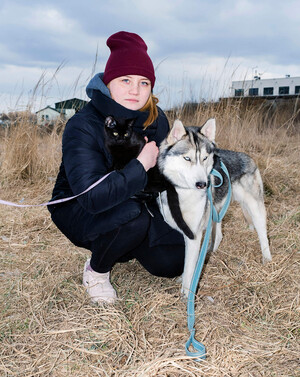Vlada (21) from Kyiv
I worked as a barista in a Kyiv café. Our grandmother died before the war. Before she died, she said: “There’s going to be a war.” This is a terrible thing to say, but we would not have come here with her. We would have had to stay there.
Влада (21 р.) з Kиєва
Я працювала баристою в київській кав’ярні. До війни в нас померла бабуся. Перед смертю вона сказала: «Буде війна». Недобре говорити так, як я зараз скажу, але з нею ми б сюди не доїхали. Ми б лишились там.
I worked as a barista in a Kyiv café.
Our grandmother died before the war. Before she died, she said: “There’s going to be a war.” This is a terrible thing to say, but we would not have come here with her. We would have had to stay there.
My brother (12 years old), little sister (13 years old), two elder sisters, a dog and a cat have come with me.
My parents have passed away. My husband stayed in Kyiv (currently men are not allowed to leave Ukraine) and so did another dog.
We left from Darnytsia Station—the train stops there first, there are fewer passengers there. So we got seats. Otherwise we would have had to stand the whole way.
Traveling by train with a dog is difficult. The journey took 10 hours. All this time the dog could not eat, because if he did, he would have made a mess. There was barely any room with the dog at our feet. When we arrived in Lviv, he howled so much!
We paid 3,000 hryvnias [$100] for the apartment in Lviv which we spent the night in, although the apartment was not worth it.
We were taken to the Polish border by car. Here we were greeted very warmly. Tears welled up in my eyes—how much kindness people are showing us!
One man from the USA helped us a lot. I’ll tell you from the beginning what happened. An acquaintance of mine made a documentary called “Home Games”. She filmed our family. The film was watched by many people around the world, including this American guy. When the war broke out, he wrote to the film’s director that he could help us. He called all my friends in Kyiv, in Lviv, and so we were brought all the way here. These people are so kind! Now a friend of his is taking us to Poznań. Maybe he will come to us himself.
During the first days of the war we hid in the school basement. But then we read that small children die of pneumonia because they catch colds. So we went home and followed the “rule of two walls”. We would go down to the parking garage whenever a siren went off. It was even colder in the parking garage, it was windy down there. We knew we had to leave. Maybe everything will be fine, but it’s better to leave so we do not have to worry, do not have to hear those sounds… We saw people just driving away, running away.
We are still very lucky. We’re not complaining. We are really very lucky.
Medyka 10.03.2022
Я працювала баристою в київській кав’ярні.
До війни в нас померла бабуся. Перед смертю вона сказала: «Буде війна». Недобре говорити так, як я зараз скажу, але з нею ми б сюди не доїхали. Ми б лишились там.
Зі мною їде мій братик (12 років), сестричка (13 років), дві старші сестри, песик і котик.
Батьків немає. У мене в Києві залишився чоловік (зараз же чоловіків не випускають з України) і ще один собака.
Ми виїжджали з Дарницького вокзалу — туди поїзд подають найперше, там менше пасажирів. Тому нам дісталися сидячі місця. Інакше нам довелось би стояти всю дорогу.
Подорож у поїзді з собакою — це тяжко. Ми їхали 10 годин. Весь цей час собака не міг поїсти, бо тоді треба в туалет. Внизу наші ноги, і псу ледве вдалося вмоститись. Коли ми вийшли у Львові, він так скавучав!
За квартиру у Львові, в якій ми лише переночували, заплатили 3000 гривень [$100], хоча квартира того не коштувала.
До польського кордону нас підвезли машиною. Тут нас дуже тепло зустріли. Аж сльози набігли на очі, скільки люди роблять для нас добра!
Нам дуже допоміг один чоловік зі США. Як так вийшло, розкажу з самого початку. Моя знайома створила документальний фільм «Домашні ігри». Там знімалася наша сім’я. Фільм подивилось багато людей по всьому світу, зокрема і цей американець. Коли почалась війна, він напи- сав режисерці фільму, що може нам допомогти. Обдзвонив усіх своїх знайомих у Києві, у Львові, і так нас довезли сюди. Це настільки добрі люди! Тепер він через свою знайому довозить нас у Познань. Може, ще й сам до нас приїде.
У перші дні війни ми ховалися в підвалі школи. Але почали читати, як маленькі діти вмирають від пневмонії, бо застуджуються на холоді. Тому пішли додому і дотримувалися «правила двох стін». Спускалися в паркінг, коли була повітряна тривога. У паркінгу було ще холодніше, там вітер дме. Ми зрозуміли, що треба від’їжджати. Може, все буде добре, але краще поїхати, щоб не хвилюватися, не чути цих звуків… Ми бачили, як люди просто їдуть, тікають.
Нам ще дуже пощастило. Ми не жаліємось. Нам справді дуже пощастило.
Медика 10.03.2022
